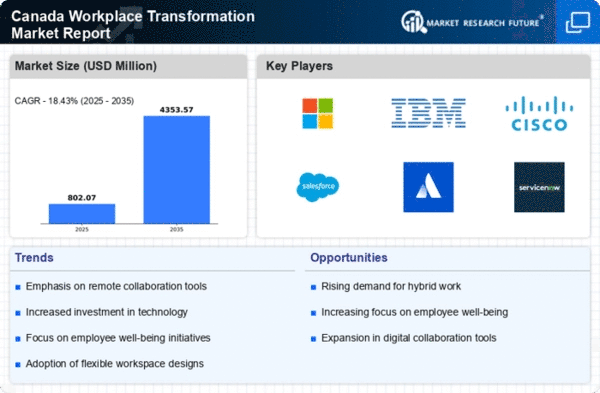Rise of Remote Work Culture
The increasing acceptance of remote work is reshaping the workplace transformation market. In Canada, a notable shift towards flexible work arrangements has emerged, with approximately 30% of employees working remotely at least part-time. This trend necessitates the adoption of advanced collaboration tools and technologies, which are essential for maintaining productivity and engagement. Companies are investing in digital platforms that facilitate seamless communication and project management, thereby enhancing the overall employee experience. As organizations adapt to this new normal, the workplace transformation market is likely to see a surge in demand for solutions that support remote work, including virtual office environments and cloud-based applications.
Emphasis on Space Optimization
The need for space optimization is a crucial factor driving the workplace transformation market. In Canada, organizations are re-evaluating their office layouts to maximize efficiency and adaptability. With the rise of hybrid work models, companies are increasingly adopting flexible office designs that accommodate both in-office and remote employees. This shift is leading to a growing demand for modular furniture and collaborative spaces that can be easily reconfigured. Research indicates that optimized workspaces can enhance productivity by up to 25%. As businesses strive to create environments that foster collaboration and innovation, the workplace transformation market is likely to expand in response to these evolving needs.
Investment in Employee Well-being
Organizations in Canada are increasingly prioritizing employee well-being, which is becoming a critical driver in the workplace transformation market. Companies are recognizing that a healthy workforce leads to higher productivity and lower turnover rates. As a result, investments in wellness programs, mental health resources, and ergonomic workspaces are on the rise. According to recent studies, businesses that implement comprehensive well-being initiatives can experience a 20% increase in employee satisfaction. This focus on well-being is prompting organizations to rethink their physical spaces and incorporate features that promote health, such as natural lighting and collaborative areas, thereby driving growth in the workplace transformation market.
Regulatory Compliance and Safety Standards
The evolving landscape of regulatory compliance and safety standards is a significant driver in the workplace transformation market. In Canada, organizations are required to adhere to stringent health and safety regulations, which are influencing workplace design and operations. Companies are investing in technologies and infrastructure that ensure compliance with these standards, such as air quality monitoring systems and touchless technologies. This focus on safety not only protects employees but also enhances overall workplace efficiency. As regulations continue to evolve, the workplace transformation market is expected to grow as businesses seek solutions that align with compliance requirements while fostering a safe and productive work environment.
Technological Advancements in Communication
The rapid evolution of communication technologies is significantly influencing the workplace transformation market. In Canada, businesses are increasingly adopting tools such as video conferencing, instant messaging, and project management software to enhance collaboration. The market for communication technology is projected to grow by 15% annually, reflecting the demand for more efficient and effective ways to connect teams. As organizations seek to improve communication and streamline workflows, investments in these technologies are becoming essential. This trend not only facilitates better teamwork but also supports the shift towards hybrid work models, further propelling the workplace transformation market.
















